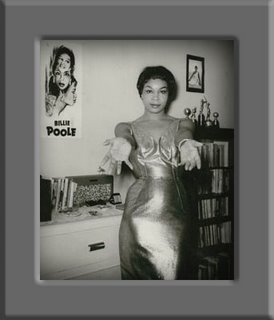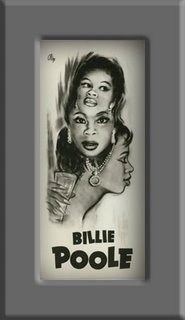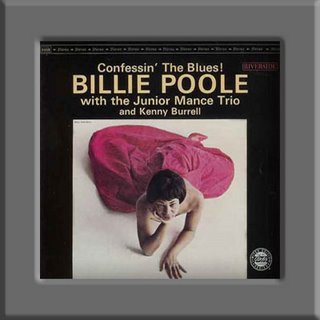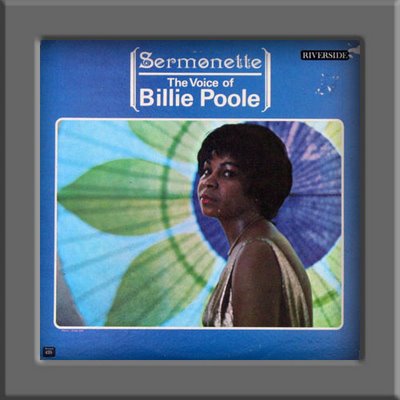BILLIE POOLE 1961-62
I just learned that Billie Poole died in May 2005. After her second recording in 1962, we didn't hear much of her. If anyone knows anything about what happened to Billie during all these mere as 40 years, the informations would be warmly welcomed.
Sometimes there is no point in being cautious or overly subtle about a situation, so let's come right out with it: Billie Poole is a young singer very much worth listening to. And she is a singer you surely will be listening to a great deal, starting right now. Because Billie Poole has got what it takes, and lots of it.
This is a singer of rare strength –in at least two senses of that word. Strong because her voice is unusually and compelling rich, full and powerful. And strong because her appeal is not derived from any vocal trickery or passing fads. It is deeply and firmly based, above all, on that rock-solid foundation known as the blues.
There's a well-established musical saying to the effect that it's how well they deal with the blues that is the best way of telling the men from the boys. The reference, of course is to unstrumentalists, and I'm a bit unsure as to the most grammatical and politest way of applying this yard-stick to girl singers, but the fact remains a vitally accurate one. And in neither case is the use of the word "blues" intended to limit matters to the strict 12-bar form. The overall idea is: if you can feel the essence of the blues, and can project that particular kind of warmth and emotional message to your audience –if you can, you've got what counts. If you can't, forget it. Billie Poole can.
Since this is essentially a matter of feeling and soul and communication through music, there is little reason to get into technicalities and details about it. Certainly not when this album is filled with all the necessary living evidence.
Although this recording offers the first opportunity for most stay-at-home Americans to hear Billie, the early career of this California raised singer is actually another of those stories of the artist who had to journey far from home to gain recognition. For Billie Poole is not at all an unfamiliar name in Europe. During the late 50's she appeared in a good many countries from Turkey to Scandinavia, with much time spent in Paris clubs and on the french television, leading to her being "discovered" in Paris by Riverside's Bill Grauer and her return to this country.
As with almost any young singer, Billie has listened to and absorbed from the best of those who came before. She herself notes that "I admire Ella Fitzgerald, but I think it's Dinah Washington I'm closest to". There is also indication of having listened well to Billie Holiday. It should be no surprise to learn that gospel singing was an important part of her background. Before venturing to Europe, Billie had been part of a family gospel group known as The Poole Sisters. And, ever since first listening to some old recordings, blues singer Bessie Smith has been an aknowledged influence. Billie's powerful voice can at times strongly suggest that of the 30's "Empress of the blues", and she had much succes in Europe with material linked to Bessie Smith. But "Young woman's blues", one such number included here, serves to indicate the limitations of "influences". If you don't know the original recording, you can easily accept this as a strong, possibly somewhat older-sounding, blues vocal. If you are familiar with Bessie's version, you'll hear the connection, but you'll also be aware that this is no mere copy or re-creation. It is clearly Billie Poole singing, in her own very personal and very rewarding way –and that is exactly what you can hear throughout this album, and what you'll be hearing a lot of from now on.
Orrin Keepnews liner notes for "Sermonette".
Recorded in 1961-62, Billie is accompagnied by an orchestra conducted by Jimmy Jones, featuring Clark Terry trumpet. Riverside RLP 425 Mono recording.
The other Riverside "Confessin' the blues" is on CD. It's an OJC (Original Jazz Classics) Limited Edition but should be available at good stores or on the web.
The first Billie Poole recording was made in France on an Art Simmons EP: Art Simmons and his orchestra (Ducretet Thomson), recorded in Paris Nov. 9th 1959 with Art Simmons piano, Clark Terry trumpet, Elek Bacsik guitar, Michel Gaudry bass, Kenny Clarkedrums et Billie Poole. I've never seen that EP. If someone has a scan of this record… At that period, Billie was often in France at the Mars Club (1960-61), at the Trois Mailletz Club (1968-69) with Memphis Slim, or at the Bilboquet Club.
This is a singer of rare strength –in at least two senses of that word. Strong because her voice is unusually and compelling rich, full and powerful. And strong because her appeal is not derived from any vocal trickery or passing fads. It is deeply and firmly based, above all, on that rock-solid foundation known as the blues.
There's a well-established musical saying to the effect that it's how well they deal with the blues that is the best way of telling the men from the boys. The reference, of course is to unstrumentalists, and I'm a bit unsure as to the most grammatical and politest way of applying this yard-stick to girl singers, but the fact remains a vitally accurate one. And in neither case is the use of the word "blues" intended to limit matters to the strict 12-bar form. The overall idea is: if you can feel the essence of the blues, and can project that particular kind of warmth and emotional message to your audience –if you can, you've got what counts. If you can't, forget it. Billie Poole can.
Since this is essentially a matter of feeling and soul and communication through music, there is little reason to get into technicalities and details about it. Certainly not when this album is filled with all the necessary living evidence.
Although this recording offers the first opportunity for most stay-at-home Americans to hear Billie, the early career of this California raised singer is actually another of those stories of the artist who had to journey far from home to gain recognition. For Billie Poole is not at all an unfamiliar name in Europe. During the late 50's she appeared in a good many countries from Turkey to Scandinavia, with much time spent in Paris clubs and on the french television, leading to her being "discovered" in Paris by Riverside's Bill Grauer and her return to this country.
As with almost any young singer, Billie has listened to and absorbed from the best of those who came before. She herself notes that "I admire Ella Fitzgerald, but I think it's Dinah Washington I'm closest to". There is also indication of having listened well to Billie Holiday. It should be no surprise to learn that gospel singing was an important part of her background. Before venturing to Europe, Billie had been part of a family gospel group known as The Poole Sisters. And, ever since first listening to some old recordings, blues singer Bessie Smith has been an aknowledged influence. Billie's powerful voice can at times strongly suggest that of the 30's "Empress of the blues", and she had much succes in Europe with material linked to Bessie Smith. But "Young woman's blues", one such number included here, serves to indicate the limitations of "influences". If you don't know the original recording, you can easily accept this as a strong, possibly somewhat older-sounding, blues vocal. If you are familiar with Bessie's version, you'll hear the connection, but you'll also be aware that this is no mere copy or re-creation. It is clearly Billie Poole singing, in her own very personal and very rewarding way –and that is exactly what you can hear throughout this album, and what you'll be hearing a lot of from now on.
Orrin Keepnews liner notes for "Sermonette".
Recorded in 1961-62, Billie is accompagnied by an orchestra conducted by Jimmy Jones, featuring Clark Terry trumpet. Riverside RLP 425 Mono recording.
SERMONETTE LP
The other Riverside "Confessin' the blues" is on CD. It's an OJC (Original Jazz Classics) Limited Edition but should be available at good stores or on the web.
The first Billie Poole recording was made in France on an Art Simmons EP: Art Simmons and his orchestra (Ducretet Thomson), recorded in Paris Nov. 9th 1959 with Art Simmons piano, Clark Terry trumpet, Elek Bacsik guitar, Michel Gaudry bass, Kenny Clarkedrums et Billie Poole. I've never seen that EP. If someone has a scan of this record… At that period, Billie was often in France at the Mars Club (1960-61), at the Trois Mailletz Club (1968-69) with Memphis Slim, or at the Bilboquet Club.







1 comment:
Another great suggestion, Daniel. Love her voice. I'll be sure to seek out more info on the web too. Interesting lady.
L
Post a Comment